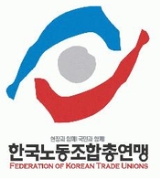
Federation of Korean Trade Unions
Encyclopedia
The Federation of Korean Trade Unions (FKTU) was formed in 1961 after a military coup
, and the dissolution of the General Federation of Korean Trade Unions and its affiliates. The FKTU was placed under the guidance of the military authorities.
The FKTU was the sole legal trade union center in South Korea until the Korean Confederation of Trade Unions
was finally recognised in November, 1999.
The FKTU is affiliated with the International Trade Union Confederation
and in 2007 had 740,308 members.
Coup d'état
A coup d'état state, literally: strike/blow of state)—also known as a coup, putsch, and overthrow—is the sudden, extrajudicial deposition of a government, usually by a small group of the existing state establishment—typically the military—to replace the deposed government with another body; either...
, and the dissolution of the General Federation of Korean Trade Unions and its affiliates. The FKTU was placed under the guidance of the military authorities.
The FKTU was the sole legal trade union center in South Korea until the Korean Confederation of Trade Unions
Korean Confederation of Trade Unions
The Korean Confederation of Trade Unions is a national trade union centre officially established in 1995. Its predecessor was the National Council of Trade Unions , established in 1990 as an independent alternative to the Federation of Korean Trade Unions. With 682,418 members in 2007, the KCTU...
was finally recognised in November, 1999.
The FKTU is affiliated with the International Trade Union Confederation
International Trade Union Confederation
The International Trade Union Confederation is the world's largest trade union federation. It was formed on November 1, 2006 out of the merger of the International Confederation of Free Trade Unions and the World Confederation of Labour...
and in 2007 had 740,308 members.
See also
- 1996-1997 strikes in South Korea1996-1997 strikes in South KoreaIn December 1996 and January 1997, South Korea experienced the largest organized strike in its history, when workers in the automotive and shipbuilding industries refused to work in protest against a law which was to make firing employees easier for employers and curtail labor organizing...
- List of Korea-related topics
- Politics of South KoreaPolitics of South KoreaPolitics of the Republic of Korea takes place in the framework of a semi-presidential representative democratic republic, whereby the President is the head of state, and of a multi-party system. Executive power is exercised by the government. Legislative power is vested in both the government and...
- Economy of South KoreaEconomy of South KoreaSouth Korea has a market economy which ranks 15th in the world by nominal GDP and 12th by purchasing power parity , identifying it as one of the G-20 major economies. It is a high-income developed country, with a developed market, and is a member of OECD...
- Trade unions in South KoreaTrade unions in South KoreaThe Korean Ministry of Labor announced on 19 September 2008 that as of December 2007, 10.8% of workers in South Korea were in trade unions, a 0.5% increase from 10.3% in 2006. Korea’s unionization rate peaked in 1989 at 19.8% and fell to 10% 2004...

